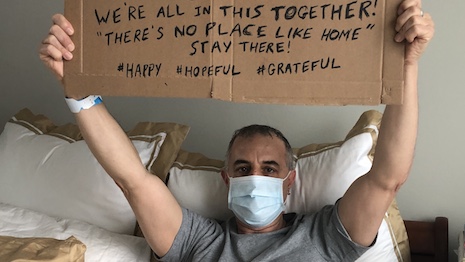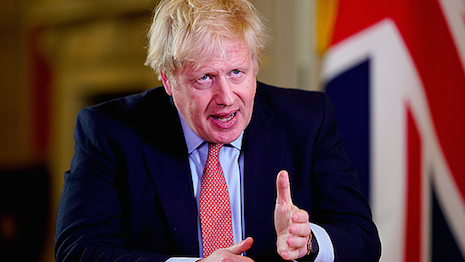- About
- Subscribe Now
- New York,
April 7, 2020

 Eric Yaverbaum, CEO of Ericho Communications, is recovering from the COVID-19 coronavirus
Eric Yaverbaum, CEO of Ericho Communications, is recovering from the COVID-19 coronavirus
The COVID-19 coronavirus pandemic has put the entire country – and most parts of the world – on pause.
Businesses, governments and individuals are all trying to cope with the ever-escalating rates of closures, losses and stress that all seem to increase every time we turn on the news.
In these uncertain times, we are all seeking reassurance from those in positions of leadership – someone with a plan who can guide us through.
How this authority communicates that plan is the essence of leadership, and in times of crisis, there are key strategies to follow for communicating constructively and effectively.
 Prime Minister Boris Johnson addressing the nation March 23 evening as he ordered a national lockdown of the United Kingdom to curb the spread of the COVID-19 coronavirus. Image credit: U.K. Prime Minister's Office. He is now in the ICU of St. Thomas Hospital in London after contracting COVID-19
Prime Minister Boris Johnson addressing the nation March 23 evening as he ordered a national lockdown of the United Kingdom to curb the spread of the COVID-19 coronavirus. Image credit: U.K. Prime Minister's Office. He is now in the ICU of St. Thomas Hospital in London after contracting COVID-19
Communication is key
First, leaders must develop a fact-based cohesive message that carries through the entire organization.
The ideal messaging in times of crisis is one that is timely, transparent, easy to understand, easily accessible to all relevant stakeholders, and balances compassion with the gravity of the situation.
One of the biggest issues with the coronavirus response in the United States was the lack of a unified effort by federal and state governments to fully inform the populace of the risk posed by the coronavirus.
Official messaging was routinely contradictory and misinformation propagated wildly throughout news and social media, confusing the general public and making it more difficult to organize an adequate response.
Had leaders come to a united understanding of the situation, based on all having the same facts, they could have developed a messaging strategy that would have delivered accurate, timely updates that mitigated the panic instead of inspiring so much of it.
For businesses, employees are one of the first groups that should be informed during a crisis. They need to know if and how the situation will affect their ability to work, insight into management’s decision-making process, and any new policies the company is putting in place in response to the crisis.
This information should be readily available, and always communicated by company leadership.
Any changes in the workplace due to new government policies should be thoroughly explained to employees in simple, straightforward language as opposed to the often circuitous legalese of government communiqué.
The same principles should guide communications with customers and clients, with adjustments made based on what they care about.
Customers and clients need to know how the crisis will affect the products and services offered by the business, what steps are being taken to protect their experience at this time – i.e., increased and more intensive cleaning policies, “specialty hours,” and expansions or reductions in service – and relief options available to them.
While it should not need to be said, all businesses should reject exploiting the crisis for gain. Selling opportunities based on the COVID-19 pandemic have been roundly criticized the world over.
For essential businesses communicating and enforcing new policies for clients and customers based on social distancing guidelines, constant and consistent reminders and distinct changes in how business is conducted will be required.
Customers and clients should be informed of these changes proactively through as many channels as possible to avoid panic and confusion at the business site.
With crisis comes increased market volatility, so investors should also be considered and communicated with during a crisis. Here is where reassurance will play a key role in your messaging.
Shareholders need to understand what the business is doing about the problem and the near-term challenges the business will face due to the crisis. Be transparent with them about the changes and challenges while also reminding them of the long-term goals of the organization.
The crisis is a storm to weather and encouraging investors to weather it with the business will help them to see growth when the storm has passed.
 Eric Yaverbaum, CEO of Ericho Communications, says communication is key with a proper handover process if the leader is infected with the COVID-19 coronavirus
Eric Yaverbaum, CEO of Ericho Communications, says communication is key with a proper handover process if the leader is infected with the COVID-19 coronavirus
Hits home
For the past three decades, I have taken on various forms of leadership – I have been at the helm of two separate agencies in that time, and I had the esteem honor of chairing the Gotham Chapter of the Young Presidents Organization for almost a decade – and I have seen my peers, associates and employees through many ups and downs.
I thought my biggest tests had come and gone, like many other New Yorkers, in 2001 on that fateful eleventh day of September.
However, as the COVID-19 pandemic continues to change so much of our lives, I have found myself thrown into the center of it just days ago – in a medical tent outside of Mount Sinai suffering through The symptoms: dry hacking cough, extreme exhaustion, unforgiving body aches, low-grade fever, difficulty breathing, and loss of taste and smell.
The experience I had that day is something I am still processing: the fear and the pain of those much worse off than me, the exhaustion on the faces of the nurses and doctors treating patients, but also the grit, determination and hope of everyone coming together to overcome this illness. It was surreal and still very much weighs heavily on my mind.
I also found myself forced to answer a profoundly new question: what does a leader do when they find themselves sidelined by the very same crisis he or she is trying to guide the team through? If you find yourself in this situation, this is what I recommend.
I am recovering day by day, but I cannot get the devastation I witnessed – and keep witnessing with exponentially growing numbers of those suffering with COVID-19 – out of my mind.
I implore everyone reading this, whether healthy, sick, in positions of leadership or otherwise, to please do your part to flatten the curve.
Another job will be there, opportunities will reappear, and businesses will reopen eventually – but if and only if we can get this under control.
Use technology and get creative to collaborate remotely.
Refrain from unnecessary travel and practice social distancing when you do go outside.
Only share information from credible sources and experts regarding symptoms, treatment and resources about the virus.
Donate to funds and organizations dedicated to helping the hardest hit by the virus: healthcare workers, essential workers and the individuals and families suffering with the disease.
REMEMBER TO practice kindness with yourself and others. And please, please, there is no place like home, so stay there.
Eric Yaverbaum is CEO of Ericho Communications, New York.
Share your thoughts. Click here